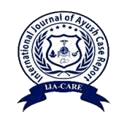Management of Idiopathic Sensorimotor Axonal Peripheral Neuropathy through Panchakarma: A Case Report
Abstract
Peripheral neuropathy refers to conditions that involve damage to the peripheral nervous system which is a large communication network that sends signals between the central nervous system and all other parts of the body. The present study deals with a 55 years old female patient working as a housewife came with complaints of pain at both hands and feet, burning sensation, weakness and numbness at both feet associated with disturbed sleep and burning sensation in abdomen on consumption of pungent, sour, salt and hot food substances since last 1 year. Patient was previously diagnosed based on EMG study which showed electrophysiological evidence of sensory motor peripheral neuropathy of axonal type involving bilateral lower limbs. Ayurvedic diagnosis of Pittavritta Vata was made because of its resemblance to presenting symptoms. Patient was treated with Udwartana (~dry powder massage), Virechana Karma (~purgation therapy), Ksheera Basti (~milk decoction enema) and Shamana Snehapana (~medicated ghee intake). After treatment, marked improvement was seen in symptoms, reduction in VAS score and NPS score. Panchakarma therapies were found highly effective in reducing symptom score as well as in improving quality of life of patients.

